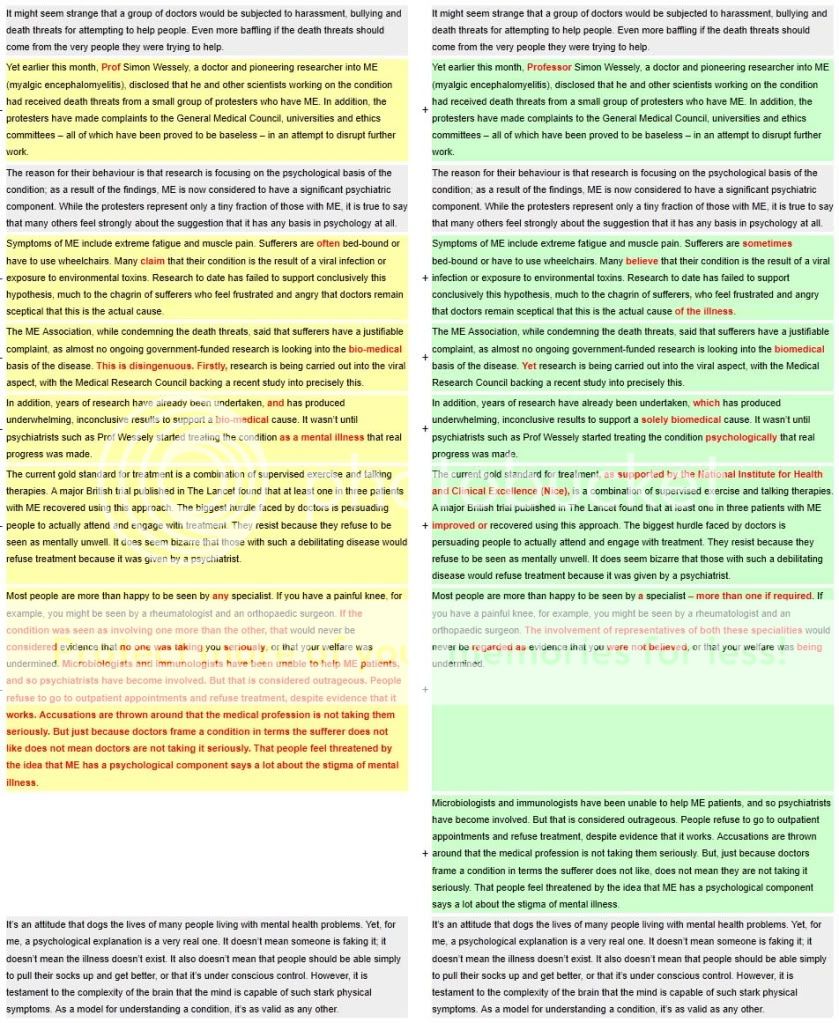Bob
Senior Member
- Messages
- 16,455
- Location
- England (south coast)
If Pemberton as a professional is so sloppy as to have stated that tissue was involved in the Lipkin study, and 1 of 3 people in the PACE Trial "recovered" (previous article), and is now citing Nater et al (2010) on Twitter as evidence for personality disturbances, how can I have automatic confidence in any of his other journalism? And if he conflates critique with harssment as many other journalists have done, how can I have confidence that all those 200 people or so were actually engaging in harassment as opposed to critique?
I don't believe that the 200 people on Twitter were 'harassing' him, in my interpretation of the word, or in any legal sense. Maybe they were just having conversations between each other, posting a number of Tweets using his username, making reasoned arguments. Using someone's username in a Tweet doesn't mean that you are addressing a Tweet towards that person. It can just mean that you are discussing the person. These tweets happen to fill up a user's Twitter stream, so it can be annoying, but it's not the same as harassment. But even if aiming a number of Tweet towards him, it doesn't equate to harassment when using Twitter. It's not like email. On Twitter, if you use someone's username, it's not the same as sending them a message. It's just a Tweet that you post on your own timeline. It doesn't get sent to the other user's inbox. Another user can choose to read the Tweet, or can ignore it. You can 'block' people very easily and painlessly, so that you can't see their tweets. He has even stated on Twitter that he is blocking anyone who is Tweeting using his username now, because they fill up his twitter stream. i.e. it's inconvenient.
Twitter:
1. I've had to start blocking them now. It's too tedious having my mentions timeline clogged up with 1000s msgs from a few people.
2. Just having to block most people now - same as last time - as just gets pointless and feed gets overwhelmed.
So he is complaining about people discussing him, because it fills up his timeline. That's all.
Nice to see him engaging so constructively with the patient community.
For the record, I've looked through all the recent Tweets that include his username, and I don't think I've seen any that are abusive, rude, harassing, impolite or unreasonable.
You can see them all here:
https://twitter.com/i/#!/search/realtime/@MaxPemberton
I'm not very interested Max Pemberton. It's just that his article has raised some interesting issues.
Reading the Tweets that have been addressed to him, in the link given above, makes me think even worse of him than I did when I originally read his article, which is saying something.
'Harrassment' for Pemberton, looks like reasonable engagement to me.
I don't believe that there are 200 ME patients on Twitter who harrass others. Not in my interpretation of the word, anyway.
There are a lot of good people on Twitter, and I believe that they were attempting to engage with Pemberton reasonably, or were having conversations using his username. This inconvenienced him.
I believe that some journalists have profoundly misrepresented our community, in quite a nasty way.
And I'm surprised to see people in this thread blaming patients for the scurrilous behaviour of these journalists.
The blame should be placed firmly with the journalists who denigrate and attack the patients community, and promote misinformation for their own ends.

